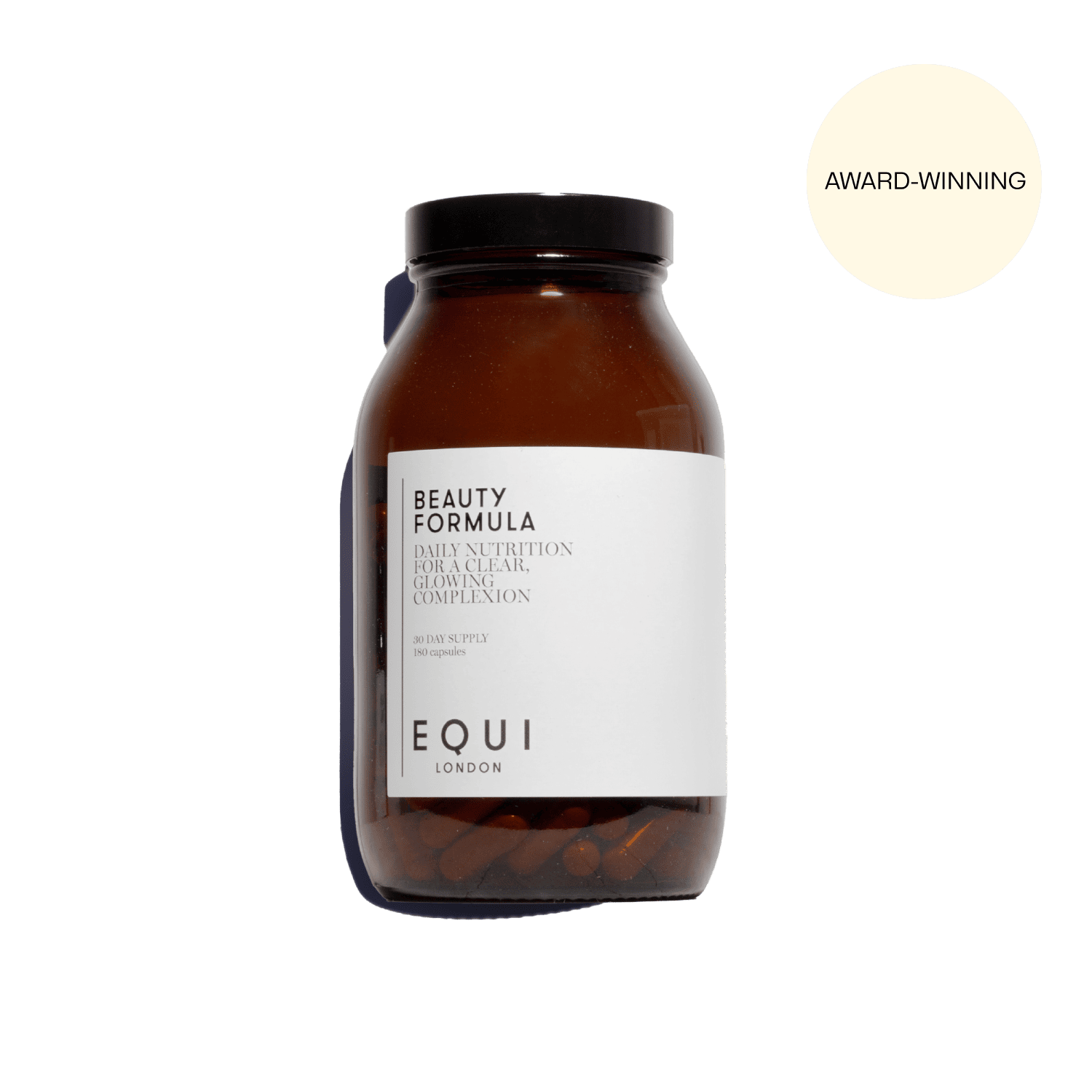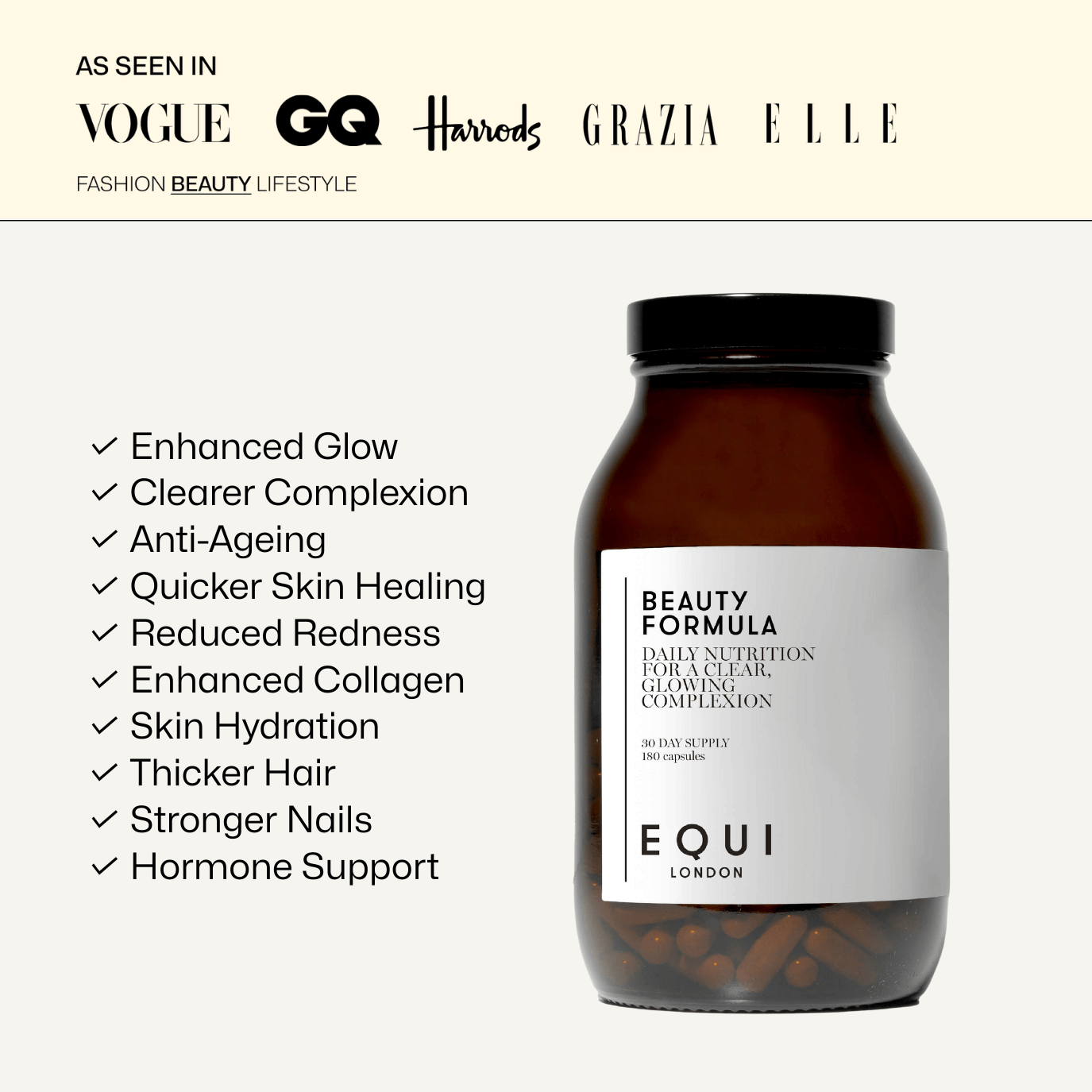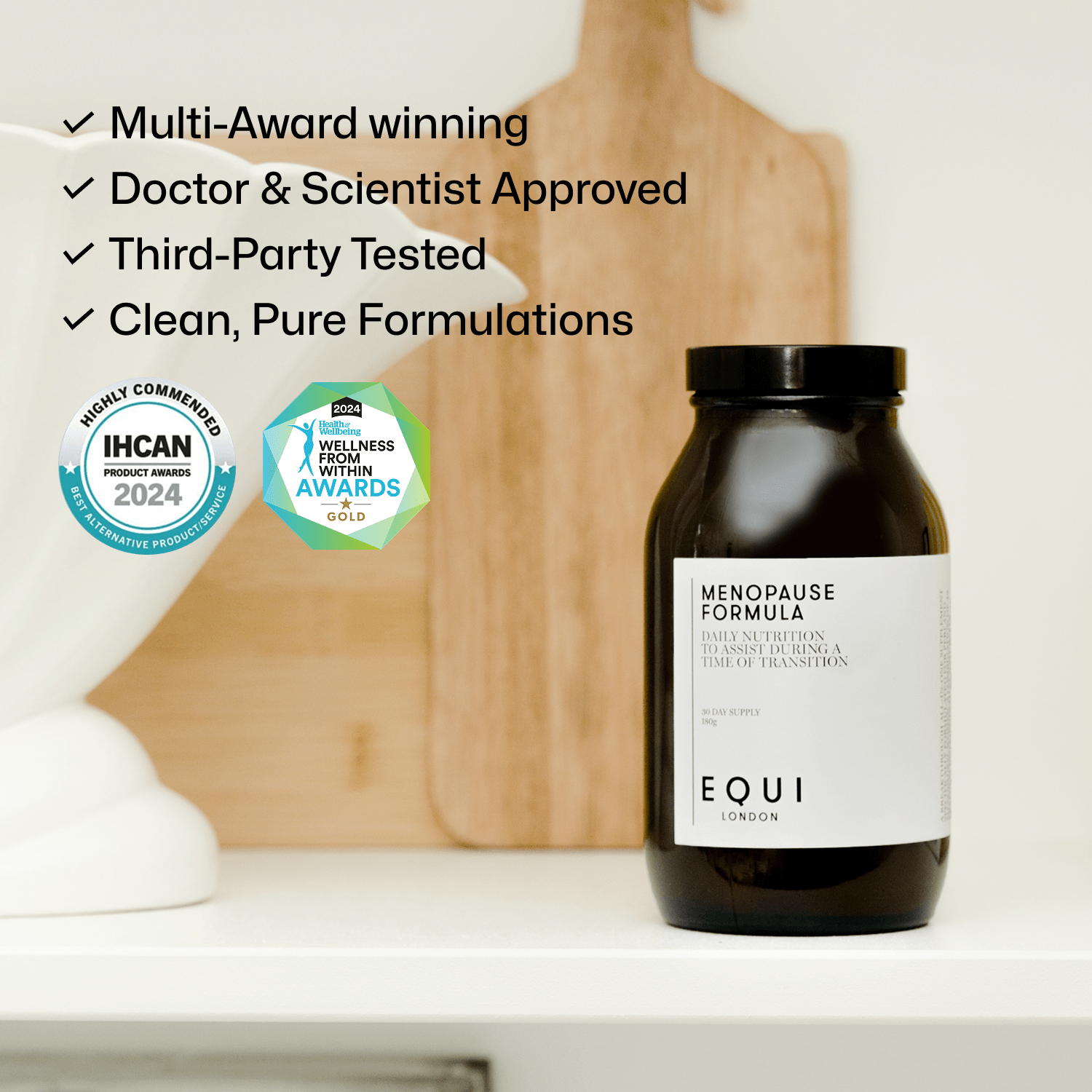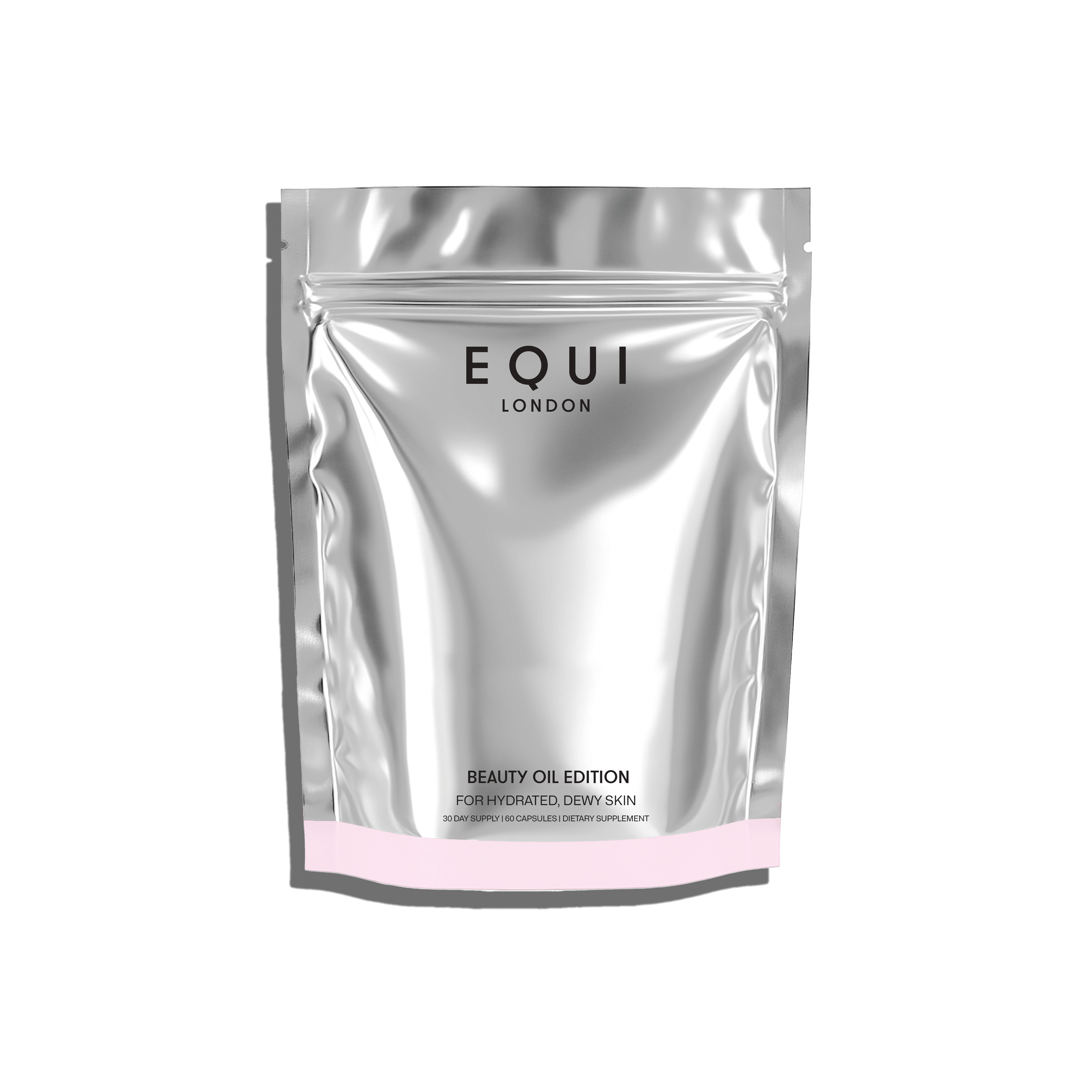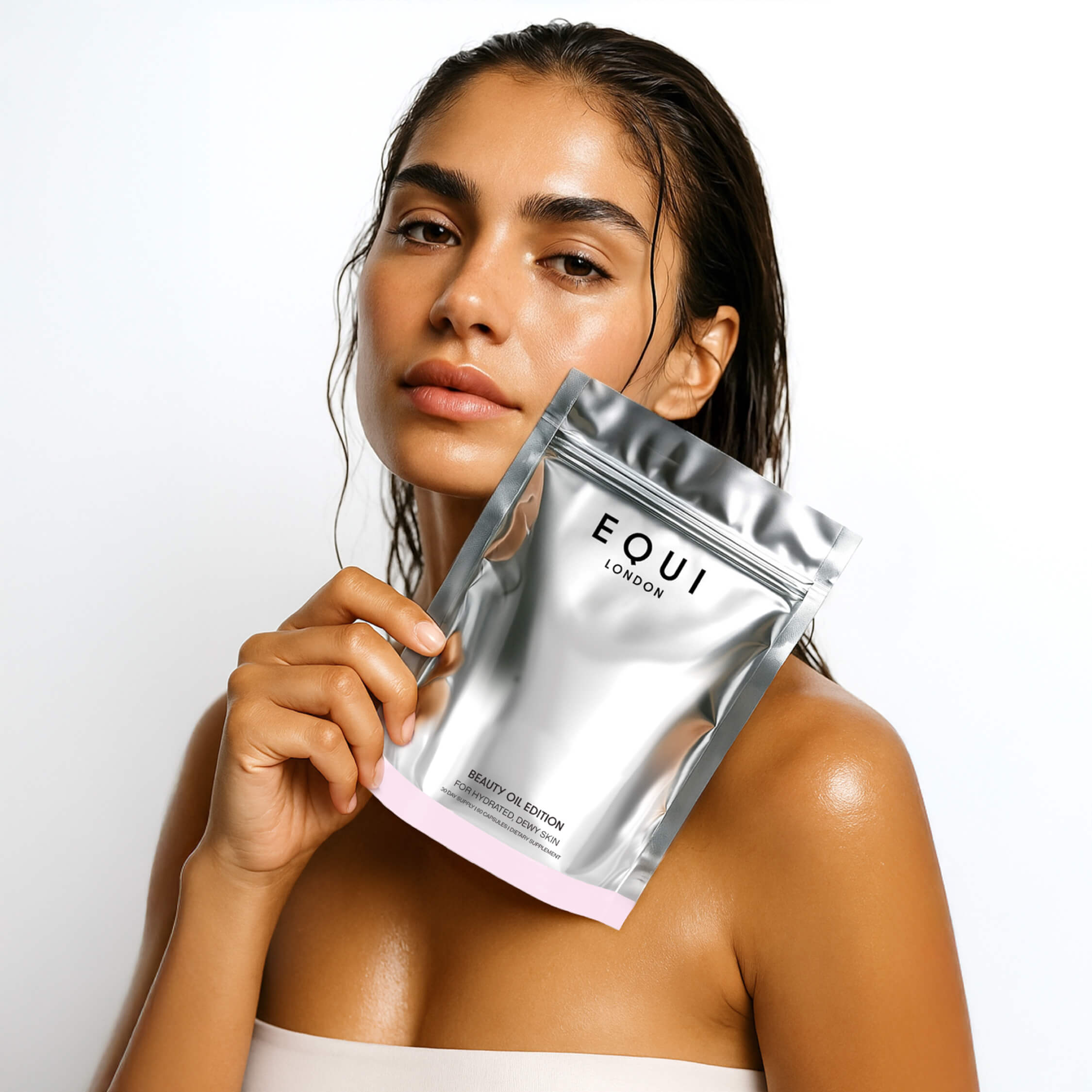In today's health-conscious world, the supplement market has exploded, offering a huge array of products that promise everything from an energy boost to perfect skin. However, beneath the glossy packaging and enticing claims lies a hidden world of ultra-processed food supplements, many of which are laden with synthetic ingredients, fillers, and additives that can undermine your health rather than support it. Here at EQUI, we totally get the confusion and frustration that you face when trying to navigate this complex landscape. Today’s blog aims to peel back the layers and expose the often-overlooked issues within the supplement industry, while highlighting the standards and practices that set trustworthy brands like EQUI apart.
One of the most concerning aspects of ultra-processed supplements is the use of fillers, binders, and flowing agents. These substances, such as titanium dioxide, magnesium stearate, talc, and silicon dioxide, are commonly used to improve the texture, shelf life, and manufacturing efficiency of supplements. However, their presence raises some questions. We delve into why these ingredients are used, their potential health impacts, and why it’s crucial to choose supplements free from unnecessary and nasty additives. Another critical issue is the prevalence of synthetic and poor-quality ingredients in many supplements. Unlike nutrients derived from either whole foods or created in superior forms, synthetic and poor-quality vitamins and minerals often lack the cofactors and bioavailability that enhance their absorption and efficacy. We will compare synthetic poor-quality supplements with those that include well researched, bioavailable forms and whole foods, such as is the case with EQUI, discussing how the latter provide a more natural and effective formulation of nutrients that the body can readily utilise. We will also highlight how the supplement industry is notorious for its regulatory gaps, which can lead to significant variability in product quality and safety. Many mass-market supplements are not subject to rigorous testing or stringent quality control measures, resulting in products that may contain contaminants, inaccurate dosages, or ineffective ingredients. Today we will explore the regulatory landscape, highlighting the importance of third-party testing and certifications. We will guide readers on how to identify reputable brands that prioritise quality, transparency, and consumer safety. What’s more, navigating supplement labels can be a daunting task, filled with misleading marketing terms and hidden additives. We will educate you on how to read and interpret supplement labels effectively. We will break down common marketing buzzwords, provide tips on identifying high-quality ingredients, and offer practical advice on what to look for in a trustworthy supplement.
Amidst the sea of ultra-processed supplements, EQUI stands out for its commitment to creating clean, effective, award-winning practitioner-grade supplements in bio-available or food state forms. We pride ourselves on our transparency and the integrity of our formulations. Our products are free from nasty ingredients, utilising only the highest quality, bioavailable nutrients that the body can easily absorb and use. The passion of founders Rosie and Alice, who are behind EQUI, is driven by a desire to bridge the gap between consumer supplements and the high standards seen in practitioner-grade products. We are dedicated to delivering supplements that actually work, supported by rigorous research and development. Understanding the hidden world of ultra-processed food supplements is crucial for making informed choices about your health. By focusing on quality, transparency, and natural ingredients, you can ensure that the supplements you choose genuinely support your wellness journey. We like to think at EQUI we exemplify these principles, offering products that you can trust to enhance your health and wellbeing. Let’s explore this topic so you feel confident navigating the complex world of ultra-processed supplements.
The Role of Fillers, Binders, and Flowing Agents in Supplements
In the world of supplements, fillers, binders, and flowing agents are commonly used to enhance the manufacturing process, improve the texture, and extend the shelf life of products. While these additives serve practical purposes, they also raise some concerns, leading to growing controversy over their use in mass-market supplements. For example, titanium dioxide is often used as a whitening agent to give supplements a bright, uniform appearance. It's also employed to improve the texture and consistency of pills and powders. Despite its widespread use, titanium dioxide has come under scrutiny due to potential risks and to us, it’s an unnecessary additive. In fact, some studies suggest that inhalation or ingestion of titanium dioxide in sensitive individuals may lead to inflammatory responses and potential cellular damage (1). Meanwhile, magnesium stearate is a commonly used lubricant that prevents ingredients from sticking to manufacturing equipment. It ensures smooth production and consistent dosage in each supplement. However, there are some concerns that magnesium stearate might impede the absorption of certain nutrients, potentially reducing the efficacy of the supplement. Surprisingly, talc is another filler and flow agent often used in supplements to stop them sticking together. There are no nutritional benefits of this additive and there may even be concerns over asbestos (2). Finally, silicon dioxide is another flow agent used to prevent clumping and improve the flow of powder ingredients during manufacturing. Although generally recognised as safe by regulatory bodies, excessive consumption of silicon dioxide has raised questions about its long-term effects (3). The use of these additives in supplements is controversial primarily because of the potential health risks associated with their long-term or excessive consumption. Concerns range from reduced nutrient absorption to reactions in sensitive individuals. Whilst small amounts of these additives may be ok, we would call into question the ‘compound effect’ of consuming these over years, especially in those with sensitivities.
When it comes to gummies, it’s a little more obvious that these are ultra-processed supplements. Extensive processing occurs to form these types of supplements and they are often sweetened with chemicals or sugars. One of the ingredients commonly used to form these supplements include carrageenan which is used to thicken or emulsify the ingredients. Although this is derived from seaweed, it is the processing of it that makes it ultra-processed. We don’t necessarily know the impact of consuming these types of ultra-processed supplements, as rigorous research or testing does not occur and most of the brands promoting this kind of product will often just rely on overzealous customer reviews or paid-for influencer promotion.
Given the controversies and health concerns, many health-conscious consumers and reputable brands are turning to natural alternatives. At EQUI, for example, we avoid unnecessary additives in our formulations, opting for natural ingredients that serve the same functional purposes without the associated risks. We use superfoods like bilberry and pomegranate as natural flowing agents. These ingredients not only help in manufacturing but also provide additional health benefits due to their rich antioxidant profiles, so it’s a double win in our opinion! Another natural alternative we use is organic rice concentrate, which helps maintain the consistency and quality of their products without the need for synthetic additives. For flavouring our powders, we use plant-based natural sweetener stevia, ensuring a pleasant taste without artificial sweeteners, which can disrupt the gut microbiome. In our capsules, we omit sweeteners entirely, allowing consumers to choose a product free from stevia.
When it comes to encapsulation, we use methyl-cellulose which is a vegan and natural alternative to synthetic materials commonly used in ultra-processed supplements such as polydextrose and hydroxypropylmethylcellulose. Whilst they are one-name compounds, they are chemically formed and are made up by a number of different ingredients. For example, polydextrose is formed from glucose, sorbitol and citric or phosphoric acids, whilst hydroxypropyl methylcellulose is produced by treating cellulose with sodium hydroxide to form alkali cellulose, which is then reacted with propylene oxide and methyl chloride. This is why it’s important to read the ingredients labels and research what is being used as on the face of it, it may not be so obvious that supplements are ultra-processed. Our choice to use clean ingredients aligns with our commitment to natural and ethical product formulations.
While fillers, binders, and flowing agents are commonplace in mass-market supplements, their potential health risks and controversies make them a point of concern. Choosing supplements that prioritise natural alternatives and transparency, like EQUI does, can significantly mitigate these risks. Our approach to using superfoods, organic concentrates, and natural encapsulation methods underscores the importance of avoiding unnecessary additives, providing consumers with safer and more effective supplements. All you need to do is find your Formula here.
Synthetic Ingredients vs. Whole Food or Bio-available Nutrients
When it comes to supplements there is a significant divide between those made from low-cost synthetic ingredients and those derived from whole foods or designed to maximise bioavailability. Understanding the differences in bioavailability, effectiveness, and potential health impacts is crucial for making informed choices about supplementation. Synthetic ingredients are chemically manufactured to mimic natural nutrients. While they are often cheaper and more convenient to produce, their efficacy and safety can vary significantly compared to their natural counterparts. For example, synthetic iodine is commonly used in ultra-processed supplements to prevent deficiencies. However, its bioavailability can be inconsistent. Similarly, synthetic folic acid, a man-made version of vitamin B9, is widely used in supplements and fortified foods. Although it can help prevent neural tube defects during pregnancy, folic acid needs to be converted into its active form, 5-methyltetrahydrofolate (5-MTHF), by the body (4). This conversion process can be inefficient, especially for individuals with genetic polymorphisms like MTHFR mutations, leading to unmetabolised folic acid accumulating in the bloodstream, which has been associated with potential health risks (5).
In contrast, whole food-based supplements and those formulated with bioavailable forms of nutrients aim to provide a more natural and effective nutrient profile. These supplements use ingredients derived from foods or synthesised to enhance absorption and utilisation by the body. For instance, kelp, a natural source of iodine used in EQUI formulations, offers a bioavailable form of this essential mineral along with other beneficial nutrients found in seaweed, enhancing overall nutrient intake and absorption (6). Similarly, 5-MTHF, the active form of folate found in EQUI products, bypasses the conversion step required by synthetic folic acid, providing immediate availability for use by the body. This form is particularly beneficial for those with MTHFR mutations (which may affect up 60% of us), ensuring effective folate metabolism and utilisation. We also use well-researched and registered or trademarked nutrients such as VitaCholine™️, FerroChel® Iron in Pregnancy Formula and Cynatine® HNS Keratin in Collagen Edition. These ingredients have numerous studies to back up their bioavailability and effectiveness, with some amazing results seen in the research with continued use.
Bioavailability refers to the proportion of a nutrient that is absorbed and utilised by the body. Whole food-based and bioavailable supplements often exhibit superior bioavailability compared to synthetic forms. For example, magnesium bisglycinate which we use in EQUI formulations is considered one of the most bioavailable forms of magnesium due to its chelation with glycine, an amino acid that facilitates better absorption in the intestines compared to other forms like magnesium oxide or citrate. Studies have shown that magnesium bisglycinate has a higher bioavailability and is less likely to cause gastrointestinal discomfort, making it more effective for increasing serum magnesium levels and providing therapeutic benefits (7). This superior absorption rate ensures that a greater proportion of magnesium is utilised by the body, enhancing its overall efficacy. What’s more, we also ensure that nutrients that work together are included in our formulations, such is the case with vitamin D3 and K2. Without K2, vitamin D may not be as well utilised by the body and get to where it is required. Finally, the use of synthetic ingredients can sometimes lead to nutrient imbalances and may elevate serum levels, without reaching the cells where they are needed. On the other hand, whole food-based supplements provide nutrients in their natural matrix, which includes cofactors that aid in absorption and utilisation, reducing the risk of imbalances and promoting overall health.
While synthetic ingredients are common in the supplement industry, their bioavailability and effectiveness can be inferior to those derived from whole foods or formulated for enhanced absorption. Choosing supplements with bioavailable forms of nutrients or those derived from whole foods, like those offered by EQUI, ensures better nutrient absorption, utilisation, and overall health benefits. The use of superior ingredients like kelp for iodine and 5-MTHF for folate highlights the importance of prioritising quality and efficacy in supplementation. To read more about the research behind our nutrients, see here.
Quality Control and Regulatory Gaps in the Supplement Industry
The regulatory landscape for dietary supplements in the UK and EU is complex but often lacks the stringent oversight seen in other industries. This regulatory gap creates a significant difference between ultra-processed, mass-market supplements and high-quality products that prioritise efficacy and safety. In the UK and EU, dietary supplements are regulated as food products rather than medicines, which means they are subject to less rigorous pre-market evaluation. The European Food Safety Authority (EFSA) and the UK Food Standards Agency (FSA) are responsible for ensuring that supplements are safe for consumption and correctly labelled (8,9). However, these agencies primarily rely on manufacturers to self-regulate and ensure their products meet safety standards. This reliance on self-regulation can lead to inconsistencies in product quality and safety, especially in mass-market supplements.
As we have explored, mass-market ultra-processed supplements often contain synthetic ingredients, fillers, and additives, which can compromise their effectiveness and safety. These products are typically designed to be affordable and have a long shelf life, which often necessitates the use of less expensive, synthetic ingredients that may not be as bioavailable as their natural counterparts. The lack of stringent regulations allows such products to enter the market with minimal oversight, which can lead to issues such as inaccurate labelling, contamination, and poor-quality ingredients. In contrast, high-quality supplements often go beyond the basic regulatory requirements by implementing additional quality control measures. These products are more likely to undergo third-party testing and obtain certifications that verify their purity, potency, and safety. Third-party testing by independent laboratories ensures that the supplement contains the ingredients listed on the label in the correct amounts and is free from harmful contaminants. Transparent sourcing practices are another hallmark of high-quality supplements. This transparency helps build consumer trust and allows individuals to make informed decisions about the supplements they choose to use.
To identify reputable brands that prioritise quality and safety, consumers should look for the following indicators:
Third-Party Testing and Certifications - Check if the supplement has been tested by an independent laboratory and whether it holds certifications from reputable organisations. These certifications indicate that the product meets rigorous standards for quality and safety. For example, with Pregnancy Oil Edition, we use QualitySilver® advanced purification technology which ensures no contaminants are present. Shop Pregnancy Oil Edition here.
Transparent Ingredient Sourcing - Choose brands that provide clear information about the form their nutrients are and where they come from. This transparency can indicate a commitment to quality and ethical sourcing practices. For example, EQUI are completely transparent about the forms of nutrients used and where we obtain our fish oils (from Krill for example in Beauty Oil Edition). Shop Beauty Oil Edition here.
Accurate Labelling - Ensure that the supplement label accurately lists all ingredients and their respective amounts. Avoid products with vague or incomplete labelling. Not only do EQUI list each jar with all the nutrients present, but we also share detailed ingredient lists on our website along with the research behind our nutrients on our website.
Reputation and Reviews - Research the brand’s reputation and read reviews from other consumers. Brands with a history of consistent positive feedback and high customer satisfaction are more likely to produce quality supplements. At EQUI, we pride ourselves on our genuine reviews which highlight before and after photos so you can see the benefits of using our products.
Professional Endorsements - Look for supplements recommended by healthcare professionals or used in clinical settings. These endorsements can be a sign of trustworthiness and efficacy. EQUI is used by nutritionists, medical professionals, and doctors alike. We recently spoke with renowned Dr Federica Amati about the menopause for example. She holds a PhD in Clinical Medicine Research from Imperial College London and a master's in Public Health and endorses our brand and products.
Your Guide to Understanding Supplement Labels
Understanding how to read and interpret supplement labels is crucial for making informed decisions about your health. Many labels are filled with marketing terms and buzzwords designed to attract consumers but can often be misleading. Here’s a guide to help you navigate these labels and choose high-quality supplements.
Breaking Down Common Marketing Terms and Buzzwords
Boosting - Terms like "immune-boosting" or "energy-boosting" are common but vague. They often imply benefits that may not be supported by scientific evidence. Always look for specific claims backed by studies. We would never claim to “boost” your health, but support it and we are advocates of a 360 approach to wellness that incorporates nutrition, lifestyle factors and mental wellbeing.
Plant-Based or Vegan - While these terms indicate that the product does not contain animal-derived ingredients, they don’t necessarily speak to the quality or efficacy of the ingredients. Often ultra-processed supplements will really shout about this, but lack any solid research behind the brand. Check for additional details about ingredient sourcing and processing.
Premium - This term suggests high quality but is often used loosely without standard criteria and anyone can label a product as premium, without any regulations. Look for certifications and third-party testing to verify the product’s quality.
Naturally Derived - This can mean that the ingredients started as natural sources but may have undergone extensive chemical processing. It’s like saying crisps are naturally derived from potatoes. Whilst it is true, they are still ultra-processed! Verify the extent of processing and look for more detailed sourcing information.
Dairy-Free and Gluten-Free - These terms are important for individuals with allergies or intolerances but do not indicate overall quality. Ensure that the product is also free from other unnecessary additives such as the ones we have highlighted today.
Identifying Hidden Additives and Low-Quality Ingredients
Supplement labels can be tricky, hiding undesirable additives and low-quality ingredients behind scientific-sounding names. Here are some common culprits:
Fillers and Binders - Ingredients like titanium dioxide, magnesium stearate, talc, and silicon dioxide are used to improve texture and shelf life but can affect the body negatively. Avoid products with these unnecessary additives.
Artificial Colours, Sweeteners and Flavours - These can cause allergic reactions and other health issues. Opt for products that use natural flavours and colours.
Preservatives - While some preservatives are necessary, excessive use of synthetic preservatives can be harmful. Look for minimal, natural preservatives.
Where EQUI Stands
At EQUI, we are committed to redefining the standards of the supplement industry by prioritising quality, transparency, and scientific integrity. Our approach directly addresses the issues discussed in this blog, ensuring our products stand out in a crowded and often confusing marketplace. One of the core principles at EQUI is the use of high-quality, bioavailable ingredients. Unlike many mass-market supplements that rely on synthetic ingredients and fillers, our formulations prioritise natural, easily absorbed nutrients. For instance, we use 5-methyltetrahydrofolate (5-MTHF) instead of synthetic folic acid to ensure that our customers receive the most effective form of this essential vitamin. Similarly, we choose magnesium bisglycinate over magnesium oxide due to its superior bioavailability and gentleness on the digestive system. This commitment to quality ensures that our supplements deliver real, noticeable benefits.
Transparency is a cornerstone of EQUI’s philosophy. We believe that consumers have the right to know exactly what they are putting into their bodies. That’s why we provide comprehensive ingredient lists and clear sourcing information for all our products. Our labels are free from misleading marketing buzzwords and instead focus on providing clear, evidence-based information. We are also committed to avoiding unnecessary additives using natural alternatives like superfoods (e.g., bilberry and pomegranate) and organic rice concentrate to act as natural flowing agents. For flavouring, we avoid synthetic sweeteners or sugars and use a small amount of plant-based natural sweetener stevia in our powders, while our capsules are free from sweeteners, allowing consumers to choose a product that suits their preferences. Our encapsulation process for our Formulas uses methyl-cellulose, ensuring that our products are suitable for a wide range of dietary requirements.
EQUI products are not just high quality; they are also grounded in scientific research. Co-founder Alice Mackintosh, a registered nutritional therapist, brings her extensive knowledge and clinical experience to every formulation. She continuously reviews the latest scientific literature and applies her findings to develop supplements that are both safe and effective. This rigorous approach ensures that our products meet the highest standards of efficacy and safety. To further guarantee the quality and safety of our products, we invest in third-party testing and obtain relevant certifications. These independent verifications provide our customers with the confidence that they are consuming supplements free from contaminants and accurately dosed as per our label claims.
Finally, at EQUI, we are driven by the impact our products have on our customers' lives. We receive incredibly moving testimonials weekly, detailing how our formulations have positively affected their health. Whether it's managing menopausal symptoms, enhancing energy and mental clarity, or improving skin health, these stories are a testament to the effectiveness of our products. This feedback motivates us to maintain our high standards and continuously seek ways to improve.
We like to think EQUI stands as a beacon of quality, transparency, and scientific integrity in the supplement industry. We are dedicated to using superior, bioavailable ingredients, avoiding unnecessary additives, and ensuring our products are backed by rigorous scientific research. Our commitment to transparency and third-party testing further underscores our dedication to providing consumers with supplements they can trust. At EQUI, we are not just selling supplements; we are offering a pathway to better health and well-being, rooted in the highest standards of quality and integrity. Shop our Formulas here.
Disclaimer: All of the information on this website is provided for general information only, it should not be treated as a substitute for the medical advice of your own doctor or any other health care professional providing personalised nutrition or lifestyle advice. If you have any concerns about your general health, you should contact your local health care provider. No one diet or supplement regime works for everyone and you should always seek help from a GP and registered health expert before making changes to your diet, or before introducing any supplements. This is especially important when pregnant.
References
- Shi, H., Magaye, R., Castranova, V., & Zhao, J. (2013). Titanium dioxide nanoparticles: a review of current toxicological data. Particle and Fibre Toxicology, 10(1), 15.
- Gordon RE, Fitzgerald S, Millette J. (2014) Asbestos in commercial cosmetic talcum powder as a cause of mesothelioma in women. Int J Occup Environ Health. 20(4), pp. 318-32.
- EFSA Panel on Food Additives and Nutrient Sources added to Food (ANS); Younes M, Aggett P, Aguilar F, Crebelli R, Dusemund B, Filipič M, Frutos MJ, Galtier P, Gott D, Gundert-Remy U, Kuhnle GG, Leblanc JC, Lillegaard IT, Moldeus P, Mortensen A, Oskarsson A, Stankovic I, Waalkens-Berendsen I, Woutersen RA, Wright M, Boon P, Chrysafidis D, Gürtler R, Mosesso P, Parent-Massin D, Tobback P, Kovalkovicova N, Rincon AM, Tard A, Lambré C. Re-evaluation of silicon dioxide (E 551) as a food additive. EFSA J. 2018 Jan 17;16(1):e05088.
- Bailey, S. W., & Ayling, J. E. (2009). The extremely slow and variable activity of dihydrofolate reductase in human liver and its implications for high folic acid intake. Proceedings of the National Academy of Sciences, 106(36), 15424-15429.
- Scaglione, F., & Panzavolta, G. (2014). Folate, folic acid and 5-methyltetrahydrofolate are not the same thing. Xenobiotica, 44(5), 480-488.
- Teas, J., Pino, S., Critchley, A., & Braverman, L. E. (2004). Variability of iodine content in common commercially available edible seaweeds. Thyroid, 14(10), 836-841.
- Uberti F, Morsanuto V, Ruga S, Galla R, Farghali M, Notte F, Bozzo C, Magnani C, Nardone A, Molinari C. Study of Magnesium Formulations on Intestinal Cells to Influence Myometrium Cell Relaxation. Nutrients. 2020 Feb 22;12(2):573.
- European Food Safety Authority. (2021). Regulatory framework for dietary supplements. Retrieved from https://www.efsa.europa.eu/en/topics/topic/food-supplements
- UK Food Standards Agency. (2020). Guidance on food supplements. Retrieved from https://www.food.gov.uk/business-guidance/food-supplements
